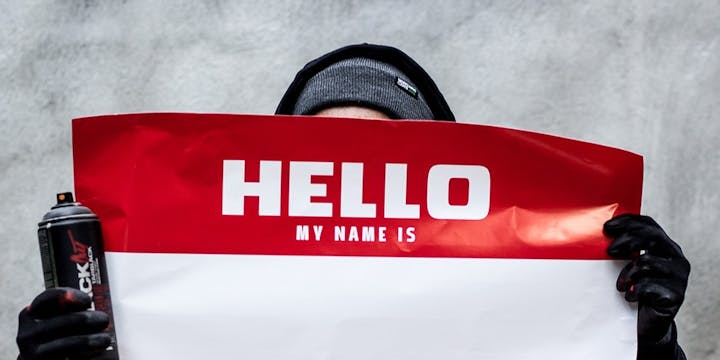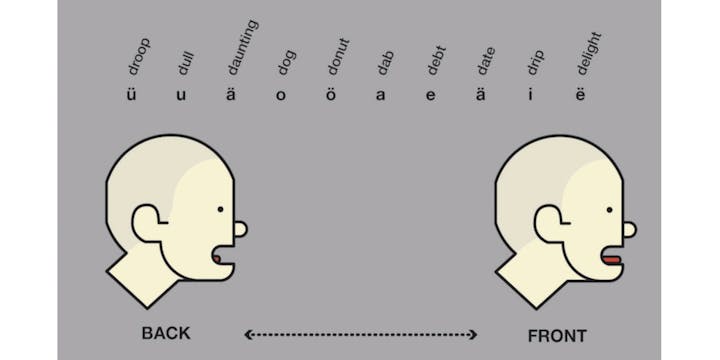WHAT'S IN A NAME?
Nobody likes to admit it, but some babies are ugly.
I’m aware that’s not a comfortable truth to face, especially for parents who’ve just produced an off-looking offspring. Nine months of back pain, and for what? A kid that looks like Gregg Wallace.
Luckily, ‘attractiveness’ is about far more than just aesthetics. Title your tyke with a more magnetic name and it might just tip them towards the category marked ‘cute’.
Let me explain...

LANGUAGE PAINTS PICTURES IN THE MIND
Never one to let fact get in the way of rhetoric, William Shakespeare once wrote…
“What's in a name? That which we call a rose by any other name would smell as sweet.”
Now, Shakespeare may be regarded as one of the greatest writers in history (second only to Eminem) but, on this occasion, Billy was talking balls.
It has long been proven that names massively affect our judgement and experience. Drinking fresh-pressed juice called ‘Sunny Frootz’ will light up pleasure receptors in your brain more effusively than the same juice labelled ‘Warm Sewage’. That’s because no matter how pleasant fresh-pressed fruits are under normal circumstances, your enjoyment of this particular drinking experience would be compromised by your perception and prejudice.
You judged it by its name, and names have the power to imply meaning, bias opinion, curry favour, create injustice, influence prospects and even shift desirability.
HIDDEN GEMS IN LANGUAGE
As language evolved, so too did our innate understanding that certain sounds can convey certain meanings.
For example, most people say that ‘flitter’ seems faster than ‘flutter’, and would rather drink soda called ‘Glig’ than ‘Glag’. When it comes to brands, Vitol implies good health. And Schweppes just sounds fizzy and refreshing, right? (Well that’s just pure luck. If Johan Schweppes had been christened Randy Flatpop, sales may not have been so high.)
When naming briefs come into the studio at LOVE, inspiration can come from anywhere - and ideas from anyone. As a copywriter, however, I believe it’s my job to delve a little deeper when it comes to language and meaning. Of course, we should never underestimate alluring alliteration and assuasive assonance. And rhyme is fine, most of the time. But there are other, more technical, tools in our writing arsenal: front and back vowel sounds, plosives, fricatives, phonesthemes, phonemes, prefixes, suffixes and good old portmanteaus, to name but a few.
Next time you’re naming a brand, baby or body part, try delving a little deeper into language and meaning.
Take phonesthemes. In the English language, certain sounds, formed by certain letter combinations, can imply particular meanings. We tend to associate ‘gl -’ with light/vision (glimmer, glisten, glitter, glitch, gleam, glow, glare, glint, glimpse). We associate ‘sn –’ with noses and mouths (snore, sneeze, snout, snarl, sniff, snort, snaffle).
Or what about front and back vowel sounds? Back-vowel sounds can carry connotations of large, slow, round, dark and long-termness (enormous, trudge, curve, gloom, prolong). Front-vowel sounds imply smallness, speed, brightness and short-termness (mini, feeble, fleeting, cheer, brisk).

These rules don’t apply to every word, of course, but can be really helpful if you want to add extra meaning to particular words and names.
Even individual letters work harder when you use them attentively. ‘L’ words lend themselves to sexuality and wantonness. It’s easy to see why. Pay attention to your tongue when you say lecherous, libido, luscious and lick.
‘H’ is heartfelt and homely - haven, house, habitat, hearth, heaven, hug. And many negative words contain the short ‘u’ sound (‘ugh’) – disgust, clumsy, muck, blunder, slum. This is perhaps why names such as Doug and Dudley don’t score so highly on the attractiveness scale.
FIRST IMPRESSIONS
Cognitive Scientist, Amy Perfor, conducted an experiment on hotornot.com - a website that rates attractiveness. She posted duplicate pictures of people, but gave them different names, and found that certain names enhanced ratings. For males, vowel sounds made at the front of the mouth (Dave, Liam, Will) were rated more attractive than names made with back-of-the-mouth sounds (Russ, Paul, Rory).
Rather unfairly, judging names blindly goes much deeper than who you’d like to take to Nando’s. This is not just about attraction; in some cases, your name can directly affect your success.
In a 1973 experiment, teachers were given essays written by fictionally named students. Those with ‘attractive or popular’ names (such as David or Laura) received significantly higher grades than students with ‘unattractive or unpopular’ names (such as Boris or Olga).
Poor Olga. She doesn’t score well for likeability either. Did you know that people evaluate things more favourably when they are forced to hold a pencil in their mouth? That’s because it forces them to smile – and we can replicate this in language. People are more likely to help individuals whose names end with a hard ‘e’ sound – Harry, Holly, Emily, Melanie – because, like the pencil in the mouth, saying those names forces you to smile.
Even brands benefit from this phenomeenon. A 2014 study identified that a disproportionate number of successful brands include hard ‘e’ sounds in their name. (Sony, LG, KFC, Wrigley, Pepsi, MTV, HP, Harley-Davidson, eBay, Barclays, Burberry and, of course, EE.)
STICKING WITH A NAME
Ok, so changing your child’s moniker is hardly ideal. But that’s ok. You could just live with it, and it WILL grow on you.
Remember that time you met your friend’s new-born baby for the first time, and they said, “Let me introduce you to Darren.” And you thought, ‘That kid doesn’t look like a Darren’. Fast forward five years and it couldn’t look more Darreny if it tried. Little Darren eyes. Darren ears. So embodying of ‘Darren’ is this kid, you almost forget that she’s a girl.
The same applies to brands and products.
The point is, names need time to breathe before they can be accepted. Do you think everyone screamed ‘YES!’ in unison when the name ‘Spotify’ was put on the table? I swear on Darren’s life, they didn’t.
IN CONCLUSION
Naming things is HARD. And soooooooo subjective. Words are fickle and resonance is personal.
That means all naming projects will be slightly different. Sometimes a name comes quickly - from a song lyric, or a lost story, or a four-year-old - and is perfect. Sometimes two weeks of professional headbanging gets you nowhere. To put a process on something this subjective isn’t always necessary, but when the headbanging gets too much, it could be the difference between a noteworthy name and lasting brain trauma.
So the next time you’re naming something, why not use some geeky language mechanics to add a little oomph?
But remember: ‘attraction’ found in words can only shift perceptions so far.
Words can’t always save us.
Some babies are just ugly.
This blog has been written by LOVE's Head of Copy, Gary Toal. Want to say hello, ask questions or question their copy knowledge? Throw an email over to hello@lovecreative.com.